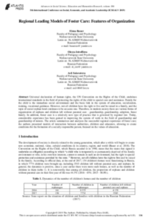Abstract
Universal declaration of human rights, the UN Convention on the Rights of the Child, enshrines international standards in the field of protecting the rights of the child to special care and assistance. Family for the child is the immediate social environment and the basic link in the system of education, socialization, training, vocational guidance. However, not all children have the right to live and be raised in a family, and the topic of social orphan hood continues to be an acute one. Therefore, in modern society there are various forms of organization of orphans and children left without parental care - guardianship, guardianship, adoption, foster family. In addition, foster care is a relatively new type of practice that is governed by regional law. Today, considerable experience has been gained in improving the system of work in the field of guardianship and guardianship of minors. The article summarizes and analyzes the successful regional experience of foster care; the authors presented models of interaction between authorities, children and educators, allowing to create conditions for the formation of a socially responsible person, focused on the values of education.

